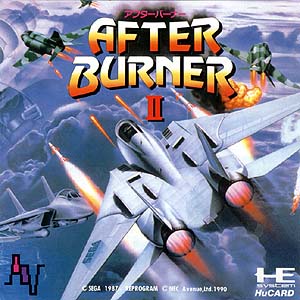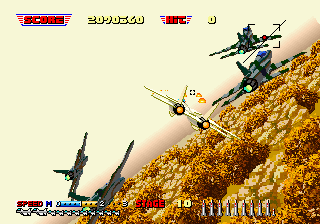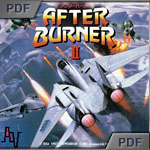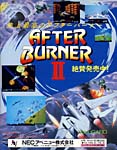|

|

|
|
アフターバーナーII
©Sega 1987
Reprogram ©NEC Avenue, Ltd. 1990
Release: 1990-09-28 (¥7200)
HuCard (4 Mbits) NAPH1011
Shooter / 3D
|
After Burner II is a fast paced 3D shooter by Nec Avenue and conversion of
Sega's arcade game of the same name originally released in 1987. The world is once
again in great danger and the evil general Zorbia and his army have decided to
take over the nation. The Carrier Sega Enterprise is deployed for a counter
operation and prepares for a first-strike attack. The player takes control of a super
F-14 Tomcat fighter jet and single-handedly tries to stop the invasion. The jet
is dizzyingly fast and the player can manoeuvre it around the screen with ease and even
trigger disorienting 'barrel-rolls'. There are two kinds of weapons - a Machine Gun
with unlimited ammo (it can only fire directed ahead of the plane and is designed to take
down close range enemies), and secondary homing-missiles that can be locked onto enemy
planes (but they come in limited quantities). However, the gameplay is not only based
on shooting enemy aircrafts and later stages feature intense sections where the player
has to out-manoeuvre other jets and missiles that appear on his tail, or fly through
narrow canyons. After Burner II consists of twenty two short stages and is
single player only.
|
 The arcade game After Burner was originally released by Sega in 1987.
This game is considered as one of the first
Sega game to use Sega's proprietary 'Super Scaler' technology
and featured fast and smooth sprite scaling, giving the game incredible and fairly
unique 3D effects (although Hang-On used the technology in 1985,
After Burner was the first game to introduce sprite rotations). The game was an
instant success and After Burner was ported to virtually every home systems at
the time, such as the Sega Master System (1987), MSX (1988),
Amstrad CPC (1988), Commodore 64 (1988), Sinclair ZX81 (1988),
Atari ST (1988), FM Towns (1989), Sharp X68000 (1989),
Amiga (1989), Famicom (1989), Master System (1989),
Megadrive 32X (1995) and was later included in compilations such as
After Burner Complete (32X, 1995) and
Sega Arcade Gallery (Game Boy Advance, 2003). After Burner II
followed the same year (1987) - however, this sequel was more an enhanced version
of the original and featured a new introduction sequence, new intermissions,
more levels, new enemies and the player started with more missiles. The game
was later converted to the Megadrive (1990) and the
PC Engine (1990), and was also included in the Sega Ages
series for the Saturn (1996) and Playstation 2 (2004).
After Burner III was released much later, in 1992, and was only
available for the FM Towns and Sega CD systems. Interestingly,
this sequel was actually a port of Strike Fighter originally released
in 1991, a pseudo sequel to G-LOC Air Battle (1990), itself a
spiritual spin-off of After Burner. G-LOC Air Battle offered
a lot similarities with After Burner, and it was also the first
game to use the R-360 cabinet which could do a full 360 rotation
angle on both horizontal and vertical axes. Another game worth mentioning
is the fan-made remake of Sega's classic called
After Burner 3D - the game was released in 2003 and was designed by
Brodaroda and published by Freeware. It is often considered
better than Sega's own attempt to bring After Burner into
the 3D polygonal realm (Sky Target 3D, released in 1997 by Sega,
was the official modernization of the arcade classic). Finally, Sega
released the arcade game After Burner Climax in 2006 - the game
features incredible 3D polygonal graphics and is a closer sequel to After Burner II
than After Burner III ever was. It was later ported and made
available to the Xbox Live Arcade and
PlayStation Network (downloadable only). Another game worth
mentioning is After Burner Black Falcon released for the
Playstation Portable in 2007.
The arcade game After Burner was originally released by Sega in 1987.
This game is considered as one of the first
Sega game to use Sega's proprietary 'Super Scaler' technology
and featured fast and smooth sprite scaling, giving the game incredible and fairly
unique 3D effects (although Hang-On used the technology in 1985,
After Burner was the first game to introduce sprite rotations). The game was an
instant success and After Burner was ported to virtually every home systems at
the time, such as the Sega Master System (1987), MSX (1988),
Amstrad CPC (1988), Commodore 64 (1988), Sinclair ZX81 (1988),
Atari ST (1988), FM Towns (1989), Sharp X68000 (1989),
Amiga (1989), Famicom (1989), Master System (1989),
Megadrive 32X (1995) and was later included in compilations such as
After Burner Complete (32X, 1995) and
Sega Arcade Gallery (Game Boy Advance, 2003). After Burner II
followed the same year (1987) - however, this sequel was more an enhanced version
of the original and featured a new introduction sequence, new intermissions,
more levels, new enemies and the player started with more missiles. The game
was later converted to the Megadrive (1990) and the
PC Engine (1990), and was also included in the Sega Ages
series for the Saturn (1996) and Playstation 2 (2004).
After Burner III was released much later, in 1992, and was only
available for the FM Towns and Sega CD systems. Interestingly,
this sequel was actually a port of Strike Fighter originally released
in 1991, a pseudo sequel to G-LOC Air Battle (1990), itself a
spiritual spin-off of After Burner. G-LOC Air Battle offered
a lot similarities with After Burner, and it was also the first
game to use the R-360 cabinet which could do a full 360 rotation
angle on both horizontal and vertical axes. Another game worth mentioning
is the fan-made remake of Sega's classic called
After Burner 3D - the game was released in 2003 and was designed by
Brodaroda and published by Freeware. It is often considered
better than Sega's own attempt to bring After Burner into
the 3D polygonal realm (Sky Target 3D, released in 1997 by Sega,
was the official modernization of the arcade classic). Finally, Sega
released the arcade game After Burner Climax in 2006 - the game
features incredible 3D polygonal graphics and is a closer sequel to After Burner II
than After Burner III ever was. It was later ported and made
available to the Xbox Live Arcade and
PlayStation Network (downloadable only). Another game worth
mentioning is After Burner Black Falcon released for the
Playstation Portable in 2007.
|
O
M
A
K
E
|
|


|
|
|
Click on picture to enlarge |
|
|
|
LK

|
|
Add your Pov here !
|
P
O
V
s
|
|
The original After Burner arcade game had a lot to impress with
its rotating cabinet and amazing 2D/pseudo-3D effects. But what about a
home version where the only way to get anywhere near the arcade experience
would be to somehow play in a hammock with a TV set sitting on your laps?
I have to say, NEC Avenue did an excellent job and I still can't
believe how they managed to pull this port out of a 8-bit console. Granted
the developer had to reduce the amount of detail on screen (especially
for the background), but the game is insanely fast, the animation incredibly
smooth, and the soundtrack amazing - and this is what really matters. This
port is a really faithful recreation of Sega's classic (except for the
horrible canyon sequences). However, one aspect of this faithfulness is
also the game's greatest Achilles' heel - I have always felt that
After Burner was more a ride than a game, and shooting endless
waves of enemy fighters while avoiding heat-seeking missiles is fun at
first, but it quickly becomes repetitive - After Burner II is
not really a game you play for long stretches of time, but is perfect
for a short adrenaline rush. All in all, this port is an incredible
conversion and it really delivers the goods.
|
|
|
|